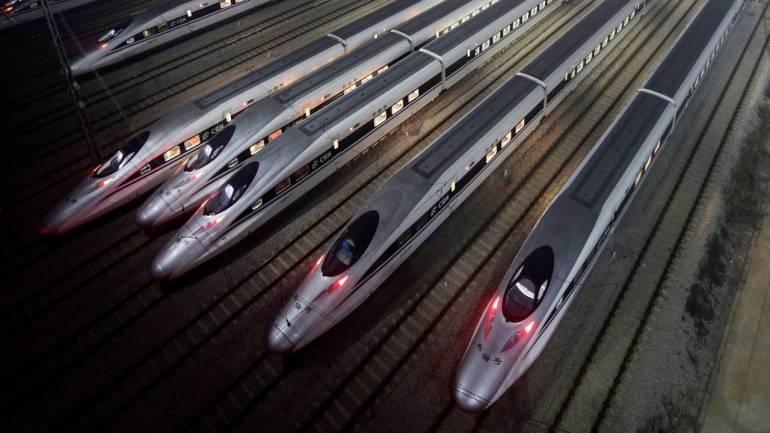Gujarat Farmers Protest against Bullet Train Project, Calls Stakeholders Meeting an Eyewash

Image Courtesy: Moneycontrol
The farmers' protests in Gujarat, against the high-speed bullet train project between Mumbai and Ahmedabad, grew louder on Monday, April 9, at the stakeholders meeting in Vadodara. The farmers, who came from as far as Surat to attend the meeting with The National High Speed Rail Corporation (NHSRC), alleged that the officials of the corporation and the local administration had informed the affected farmers about the meeting a day ahead of the event. NHSRC is the central authority entrusted with the duty to build high-speed bullet rail project.
Reports claimed that the advertisement for the meeting was published in a local newspaper, with only three sentences, a day prior to the meet. Infuriated by the consistent neglect, a group of 80 farmers and environmental activists, gathered at the Gandhi Nagar Gruh in Vadodara. They demanded that they should be given a copy of the report of the Social Impact Assessment (SIA) and sought an explanation to why the meetings, meant to address the grievances of the affected farmers, were organised in a "disorganised" manner. The High Speed Bullet train project will affect 192 villages of Gujarat and around 120 villages in Maharashtra.
Calling the meeting an eyewash, the members of Paryavaran Suraksha Samiti said the administration's efforts are focussed on conducting meetings just for the record.
“The NHSRC is attempting an eyewash by calling it a stakeholders’ meeting. All they are trying to do is to record that they had held a meeting. In reality, there is no publicity of the meeting so that farmers can attend. All they did was print a small newspaper advertisement in a single newspaper that carried just three sentences, one day before the meeting was scheduled. We have made representations and asked them to hold fair discussions and allow farmers to attend the meetings,” The Indian Express quoted an agitating farmer.
Farmers agitation across the state
The bullet train project, which traverses through various districts of Gujarat, has generated discontent among the farmers across the state. The farmers of Surat alleged that the people were not informed about the meeting. To express their concerns, some farmers even chose to travel from Surat to Vadodara to attend the meeting. They further claimed that the rates offered by the district administration were much lower than the market price.
“I travelled all the way to Vadodara as I had missed the meeting in Surat on Sunday evening. No information was circulated about it. This is unfair. The discussion is supposed to be about our opinions and understanding the project but officials are directly coming to the point of compensation and telling us that it will be decided by the collectors as per the jantri rate. We all know that the market value of our lands is much higher than the jantri rates that the government will offer. For every infrastructure project, it is the farmers who get a raw deal,” said Ramesh Patel, a farmer in Surat.
Same Project, Two different laws in Maharashtra
The agitating farmers, organised under the banner of Khedut Samaj (Gujarat), allege that the bullet train project involves both the Maharashtra and Gujarat governments. While the farmers in Maharashtra are governed by one law, the law of Gujarat does not require the consent of farmers to acquire their lands.
“In 2016, the Gujarat government had made certain changes in the land acquisition law and had come up with the new Act in which the consent of farmers was no more required and land could be forcibly acquired. In contrast, land will be acquired in Maharashtra only after negotiation with farmers. For a single project, the two state governments are working on different laws for land acquisition. The livelihood of the farmers will be snatched away by the government. The state government had started the process of measuring the land in different villages in Valsad and Navsari and local farmers are opposing it,” Jayesh Patel, President Khedut Samaj (Gujarat) said.
A financial disaster
An analysis by the Newsclick at the launch of the project revealed that it is likely to turn into a financial disaster for the country. Total costs for the Mumbai-Ahmedabad HSR project is estimated at Rs.1.1 lakh crore (US$ 17 billion). Of this, Japan will provide Rs.88,000 crore (US$ 14) at 0.5% interest rate over an extended period of 50 years, with payments to begin after 15 years if required. Amidst the claims of the project being "absolutely free" by prime minister Narendra Modi, financial analysts suggested that the repayment amount could rise to around Rs.1.5 lakh crores over 20 years.
The report also stated that bullet train is an extremely expensive project, working out to around US$ 27million per km, comparable to European costs, but higher than costs in China.
Get the latest reports & analysis with people's perspective on Protests, movements & deep analytical videos, discussions of the current affairs in your Telegram app. Subscribe to NewsClick's Telegram channel & get Real-Time updates on stories, as they get published on our website.
























